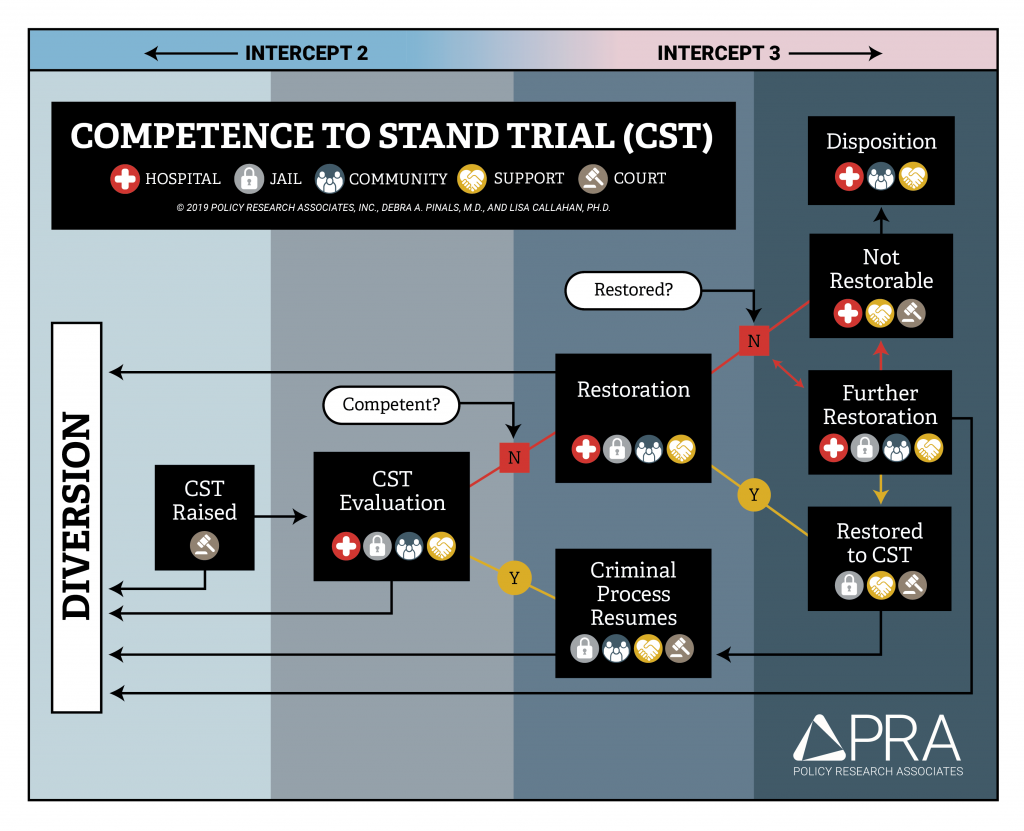In 2017, PRA renewed its work in the area of competence to stand trial/competence restoration (CST/CR) in four domains. First, PRA provided recommendations to the Commonwealth of Pennsylvania, the federal court, and the American Civil Liberties Union of Pennsylvania on strategies to reduce waitlists for CST evaluations and CR services. Similarly, PRA is currently working with the Trueblood Court Monitor’s Office, Seattle Foundation, Disability Rights Washington, and the Washington State Department of Social and Health Services to provide technical assistance to 15 diversion programs funded by the Trueblood settlement. Both cases were brought on behalf of defendants being detained in local jails who were waiting either for a CST evaluation or for CR services.
At issue in both Pennsylvania and Washington are the waitlists that pretrial defendants are placed on—often for lengths of time exceeding their possible sentence if convicted— while they wait to move through the competence system. At each decision point illustrated in the CST/CR Flowchart, pretrial defendants usually remain in custody with only minimal mental health treatment. The flowchart illustrates that each decision point is an opportunity for defendants to be diverted out of the criminal justice system and into community-based treatment where their treatment, support, and security needs can be addressed. Many additional states have ongoing litigation on these specific issues.
The second area of effort at PRA, completed in 2018, was an environmental scan and overview of the current status of the field on issues related to CST/CR, including a review of all empirical research and a state-by-state analysis of competence laws, processes, and programs. The primary conclusion from this work is that there is a lack of research to drive policy and practice. A secondary conclusion is that there is little collaboration across the mental health and justice systems to develop best practices for the CST/CR populations. Finally, the review concluded that cross-jurisdictional comparisons to identify best practices are not possible due to the lack of data.
A third significant initiative is the convening of two peer-to-peer, state-to-state learning collaboratives organized by SAMHSA’s GAINS Center, which is operated by PRA. In 2019, 8 states joined the Learning Collaborative on CST/CR that included an onsite/virtual 2-day event where state teams each convened in-person with facilitation from GAINS experts. National subject-matter experts delivered virtual presentations on key CST/CR topics. States identified goals, developed a strategic plan, and reported on their progress. In 2020, between three to six additional states will join the peer-to-peer event now under the title of the “CST/CR Community of Practice.” States will set goals, develop strategic plans, and report on progress. Continuing states will serve as mentor states to those newly embarking on improving their CST/CR process.
Finally, PRA has prioritized setting a national research agenda to begin to fill the data gaps to inform and guide best practices and to improve the CST/CR processes across the United States. Approximately 20 national leaders representing clinicians, lawyers, advocates, judiciary, and other experts were invited to participate in a series of calls, focusing on significant issues with the competence system, existing of emerging best practice models for CST and CR, model or pending legislation, and existing or ongoing research. This national convening will help to lay the foundation for systematic, empirical research on the national picture of CST/CR and to develop data-driven strategies for improving the competence process.
For more information about all of PRA’s work on competence to stand trial and competence restoration, please contact Lisa Callahan (lcallahan@prainc.com, (518) 439-7415 ext. 5232).


